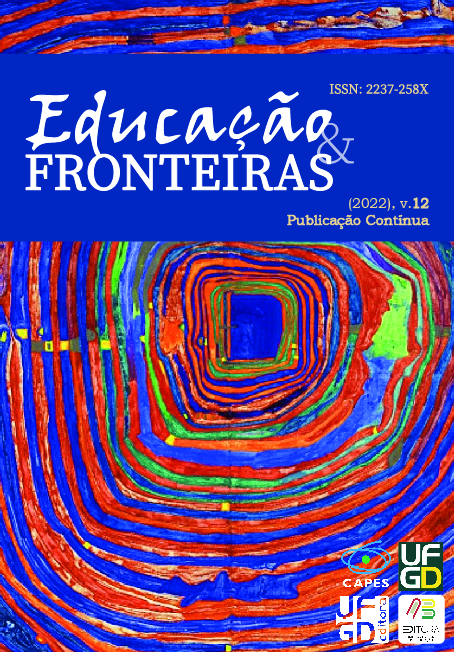The scientific production in Brazil concerning the contributions of Pibid to its graduated students
DOI:
https://doi.org/10.30612/eduf.v12i00.16144Keywords:
Education, Pibid, Graduate students, Educational policiesAbstract
This paper aims to map the scientific production in Brazil related to the contributions from the Institutional Program for Teaching Initiation Scholarship (Pibid) to graduates, from cutting of publications socialized in the period from 2014 to 2020. The used methodology was a qualitative approach, carried out through the bibliographic survey of thesis and dissertations published in the Thesis and Dissertations Bank of the Coordination for the Improvement of Higher Education Personnel (CAPES - Coordenação de Aperfeiçoamentno de Pessoal de Nível Superior) and on Brazilian Digital Library of Theses and Dissertations (BDTD), of full papers in annals from national meetings held by the National Association of Graduate Studies and Research in Education (ANPEd - Associação Nacional de Pós-Graduação e Pesquisa em Educação) and articles published in journals on Scientific Electronic Online (SciELO) database. The theoretical reference was based on texts by Marcelo (2009), Pimenta (2005), Garcia (1999) and Nóvoa (1992) and (2017). The mapping performed allowed us to observe that, for the graduates, Pibid has fulfilled its social role in the training of future teachers, contributing significantly to their performance and permanence in teaching. Moreover, among other factors, there is a gap regarding the scarcity of studies on the evaluation of policies and programs aimed at Pibid graduates, especially within the scope of institutional projects.
Downloads
References
BRASIL. Ministério da Educação. Coordenação de Aperfeiçoamento de Pessoal de Nível Superior. Portaria n. 096, de 18 de julho de 2013. Estabelece as normas gerais do Programa Institucional de Bolsa de Iniciação à Docência - PIBID. Brasília, DF: MEC, CAPES, 2013. Disponível em: https://www.gov.br/capes/pt-br/centrais-de-conteudo/portaria-096-18jul13-aprovaregulamentopibid-pdf. Acesso em: 10 dez. 2021.
FERNANDES, Domingos. Avaliação de programas e projetos educacionais: das questões teóricas às questões das práticas. In: FERNADES, Domingos (org.). Avaliação em educação: olhares sobre uma prática social incontornável. Pinhais, PR: Editora Melo, 2011.
FERREIRA, Norma Sandra de Almeida. As pesquisas denominadas “Estado da Arte”. Educação & Sociedade, ano XXIII, n. 79, ago. 2002.
GARCÍA, Carlos Marcelo. Formação de professores: para uma mudança educativa. Porto: Porto Editora, 1999.
GATTI, Bernardete Angelina. A formação inicial de professores para a educação básica: as licenciaturas. Revista USP, n. 100, p. 33-46, dez./jan./fev. 2014.
LORDELO, José Albertino Carvalho; DAZZANI; Maria Virgínia Machado. A importância dos estudos com egressos na avaliação de programas. In: LORDELO, José Albertino Carvalho; DAZZANI; Maria Virgínia Machado. (org.). Estudos com estudantes egressos: concepções e possibilidades metodológicas na avaliação de programas. Salvador: EDUFBA, 2012.
MARCELO, Carlos. Desenvolvimento profissional docente: passado e futuro. Sísifo Revista de Ciências da Educação, Lisboa, n. 8, p. 7-22, jan./abr. 2009.
NÓVOA, Antônio. A Formação de professores e profissão docente. In: NÓVOA, A. Os professores e a sua formação. Lisboa: Publicações Don Quixote, 1992. p. 13-33.
NÓVOA, Antônio. Firmar a profissão como professor, afirmar a profissão docente. Cadernos de Pesquisa, v. 47, n. 166, p. 1106-1133, out./dez. 2017.
PIMENTA, Selma Garrido. Formação de professores: identidade e saberes da docência. In: PIMENTA, Selma Garrido. (org.). Saberes pedagógicos e atividade docente. 4 ed. São Paulo: Cortez, 2005.
RUIZ, Antônio Ibañez; RAMOS, Mozart Neves; HINGEL, Murilo. Escassez de professores no Ensino Médio: Propostas estruturais e emergenciais. Relatório produzido pela Comissão Especial Instituída para estudar medidas que visem a superar o déficit docente no Ensino Médio (CNE/CEB). 2007.
Published
How to Cite
Issue
Section
License
Copyright (c) 2023 Educação e Fronteiras

This work is licensed under a Creative Commons Attribution-NonCommercial 4.0 International License.









